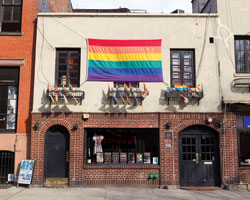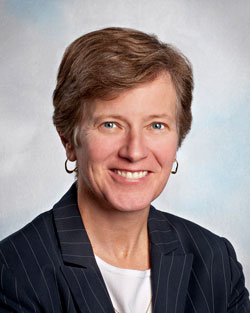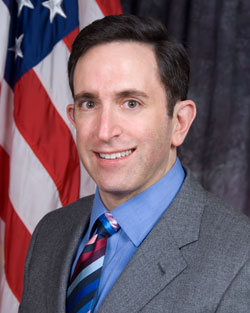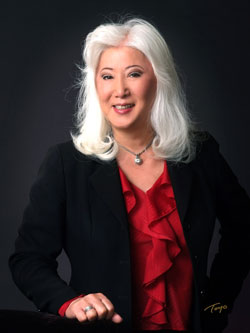The Stonewall legacy: ABA commission creates an award commemorating a key moment for LGBT rights

James Holmes: “The beginning of today’s equality movement ties to about the time of the riots.” Photo by Ben Hider/Getty Images.
Until the late hours of June 27, 1969, the Stonewall Inn had tried to keep a low profile as a gathering spot for gays in Greenwich Village. Still, like other clubs and businesses that catered to the gay community at a time when New York City law prohibited homosexuality in public, the Stonewall Inn had to endure a steady dose of police raids and other forms of harassment by authorities.
But something happened that night when the police conducted another of their routine raids on the inn. This time, patrons fought back, throwing beer cans, bricks and other objects at the police. The police responded with arrests and beatings. Those scenes were repeated the next couple of nights, as members of the city’s gay community joined the protests that have come to be known as the Stonewall Riots.
It was a seminal moment that gave impetus to the movement seeking equality for lesbian, gay, bisexual and transgender people. The first anniversary of the riots, for instance, saw the initial gay pride parades in cities like Chicago, Los Angeles and San Francisco, along with New York. Meanwhile, members of the LGBT community began asserting their civil rights on a variety of legal fronts.
“The riots were a very visible and public display where the LGBT community finally made it clear it wasn’t going to accept any more repression and poor treatment,” says James J.S. Holmes, a litigation partner at the Sedgwick law firm in Los Angeles who chairs the ABA Commission on Sexual Orientation and Gender Identity. “The beginning of today’s equality movement ties to about the time of the riots.”
The commission will harken back to that event in February when it recognizes three lawyers who have been active in the gay rights movement with its first Stonewall Awards. The commission will present the awards Feb. 9 during a reception at the 2013 ABA Midyear Meeting in Dallas.
The commission is presenting the awards as the gay rights movement reaches another critical juncture. The November elections offered some positive news for advocates. Voters nationwide elected to Congress six openly gay candidates and the first openly bisexual member. Voters in three states—Maine, Maryland and Washington—passed laws recognizing gay marriage, bringing the total to 10 (including the District of Columbia). In Minnesota, voters rejected a proposal to add a provision to the state constitution defining marriage as between a man and a woman, although a statute banning same-sex marriage remains on the books. In all, 38 states still explicitly prohibit gay marriage. The U.S. Supreme Court is expected to issue a key ruling on the topic later this year.
The first recipients of the Stonewall Awards are:
• Mary L. Bonauto, the civil rights project director at Gay & Lesbian Advocates & Defenders in Boston.
• Matt Nosanchuk, a government attorney who has worked on civil rights and LGBT issues.
• Mia F. Yamamoto, a criminal defense lawyer and human rights activist in Los Angeles.
Their stories help to illustrate the range of efforts by lawyers to gain recognition for the rights of lesbian, gay, bisexual and transgender people.
That also is the purpose of a book the commission plans to publish later in 2013. The book, titled Out and About: The LGBT Experience in the Legal Profession, will contain personal essays by lawyers who also belong to the LGBT community. “The people making submissions are incredible attorneys,” Holmes says. “I’m absolutely looking forward to seeing what they have to say, where they came from, and the challenges they overcame.”

Mary Bonauto
Mary Bonauto
A ‘lifer’ in the fight for LGBT rights
When Mary Bonauto began her legal career in 1987, it had all the traditional trappings. But soon after starting out doing commercial litigation for a law firm in Maine, she was quickly drawn into work on behalf of the LGBT community.
“Circumstance and necessity required my involvement,” she says. “The HIV epidemic was raging and the fear was enormous. I’d receive calls from men at pay phones saying, ‘My boyfriend’s family is cleaning out our apartment. What should I do?’ I was one of only three or four ‘out’ attorneys in Maine, and word spread quickly. So I immediately got involved. But sometimes there was very little you could do because of the law.”
In 1989, Massachusetts became the second state to prohibit discrimination on the basis of sexual orientation in areas like employment, housing and public accommodations. Gay & Lesbian Advocates & Defenders, which served all of New England, was looking to hire a lawyer to defend and enforce the Massachusetts law.
“To me, that was a dream job,” Bonauto says. “But I talked to lawyers practicing 20 to 30 years, and they said I’d be pigeonholing myself and throwing away my career. They thought I’d be making myself unemployable.”
Instead, Bonauto has worked on nearly every aspect of the movement to gain legal rights for members of the LGBT community. In 2003, for instance, she served as lead counsel in Goodridge v. Department of Public Health, in which the Massachusetts Supreme Judicial Court upheld the rights of gay and lesbian couples to marry.
But Bonauto doesn’t judge her work on the outcome of any particular case or efforts in any specific area. “I think there’s a body of work, and it has two components,” she says. “It’s premised on the idea that we all share a common humanity. That’s why our plaintiffs are such an important part of our work and why they have to share their stories. It’s also premised on the idea that we have to be treated equally. Our cases have allowed us to enforce the common humanity of gay people and to remind people of our principles of fair treatment under state law and the U.S. Constitution.”
Bonauto is encouraged by recent gains, but pragmatic about the battles still to come.
“Enormous progress has been made,” she says. But, she notes, it was only last May that North Carolina voters approved an amendment to the state constitution that bans marriage for same-sex couples. “I still feel like we have a very long way to go,” she says.
Until then, Bonauto calls herself a “lifer” in the push for equality. “I see myself remaining in one capacity or another until sexual orientation and gender identity aren’t a bar to freedom under the law,” she says.

Matt Nosanchuk
Matt Nosanchuk
On the inside looking out
Matt Nosanchuk has known nearly all his life how it feels to live outside the mainstream.
The son of a Canadian father and an American mother, Nosanchuk grew up in the Detroit area. “After my parents separated, we moved to Lafayette Park, a very integrated area in Detroit,” he recalls. “It was after the race riots, and the Martin Luther King project was next to the townhouse we lived in. Later I went to elementary school in suburban Grosse Pointe, which was all white. I was the only Jewish kid in my elementary school and the son of divorced parents where there were no other Jewish kids or kids with divorced parents. That was formative, and I developed a strong identification in helping the underdog.”
After law school, Nosanchuk worked on AIDS issues from 1991 to ’93 at the American Civil Liberties Union of Illinois supported by a Skadden Fellowship from the firm of Skadden, Arps, Slate, Meagher & Flom in New York City. It was a time when fear trumped knowledge. “There was a perceived conflict between civil rights and public health, and you had medical professionals declining to treat people,” he says. “There were individuals who couldn’t get health insurance because they were hairdressers, and there was a man who couldn’t get dental treatment because he was HIV-positive. That was the first time I worked on equality issues; and at that point, I was a straight guy.”
Nosanchuk came out a decade later. “As I’ve advanced in my own development, my work has an even more personal quality,” he says. “I’m working on these issues, and I’m part of this community. That’s my own evolution.”
In 2009, Nosanchuk was named senior counselor to the assistant attorney general in the Civil Rights Division at the U.S. Department of Justice. In that position, he became a key administration adviser on issues of interest to the LGBT community.
“I had to basically be a spokesperson for the administration on LGBT issues when we didn’t have the same robust policy we do now,” he says. “I had to walk that line between supporting the administration, which I did, and discussing policies and actions not overwhelmingly supported by the community.”
Nosanchuk left the DOJ last July to become associate general counsel for legal counsel in the Department of Homeland Security.
Meanwhile, the Obama administration’s positions on LGBT issues have continued to evolve. In 2010, the administration supported congressional repeal of the military’s “don’t ask, don’t tell” policy, and in 2011, the Justice Department announced that it considered the Defense of Marriage Act unconstitutional and would no longer defend it in court.
Nosanchuk “was and likely still is one of the strongest voices for the LGBT community inside the administration,” says Holmes, chair of the ABA commission. “Those who effect change within the government aren’t as visible as those who litigate within the Supreme Court. But people have been effusive in their praise of what he’s done for his community.”

Mia F. Yamamoto
Mia F. Yamamoto
Forging a path for transgender people
After nearly 30 years as a criminal defense lawyer in Los Angeles, Mia Yamamoto has a method for putting her clients at ease. “I often tell my clients I was born doing time,” she says.
That statement refers to the fact that Yamamoto was born in 1943 in an Arizona internment facility for Japanese-Americans during World War II. “We were among the last people released from camp because my father was considered such a subversive,” she says. He was an early member of the National Association for the Advancement of Colored People and became the first Asian-American to graduate from Loyola Law School in Los Angeles.
“Being born in that camp aimed me for criminal defense work,” Yamamoto says. “People being in jail unjustly was a focus of mine growing up. I’ve always focused on the underdog.” For similar reasons, Yamamoto has worked extensively on human rights and civil rights issues, especially those relating to the LGBT community. Last year she was honored by the Los Angeles County Commission on Human Relations.
But Yamamoto’s work on behalf of the LGBT community has been a personal journey as well as a professional endeavor.
Born Michael F. Yamamoto, she completed her transition from male to female in 2003. “I knew since I was 5 or 6 years old,” she says. “When I transitioned, I was already a trial lawyer and in court every day. So I knew it wasn’t going to happen under the radar.”
Many of Yamamoto’s colleagues surprised her with their support. “It was sort of a litmus test,” she says. “I was prepared for the rejection and ridicule transgender people are so likely to get. But when I’d go into court, people would give me hugs, and even the prosecutors were so embracing. I’m not going to lie. I was moved to tears. There were also people who didn’t like it, and thank goodness I realized who they were. I put them in the past tense because that’s where they belong.”
Every one of Yamamoto’s criminal defense clients backed her after she offered them the opportunity to find another lawyer. “My hoodlum murder clients all said the same thing: ‘No shit! You’re really going to do that?’ ” she says. “And then they all said ‘No problem.’ They were the best.”
For a while, Yamamoto became involved in an almost daily ritual. “When I was in transition, every new place I went, the night before, I’d say, ‘Tomorrow I’m going to liberate the district attorney’s office’ or ‘Tomorrow I’m going to liberate the Compton courthouse,’ ” she says. “I think I was steeling myself. I was going to forge a path and make it easier for people after me.”
Yamamoto believes she’s accomplished that. “I’ve seen other people go forward in my wake, people who approached me before they did it,” she says. “I told them, ‘Believe me, it’s going to be OK. If you need me to, I’ll run interference for you.’ ”
Last updated Feb. 13 to clarify the identification in the article of Matt Nosanchuk.



